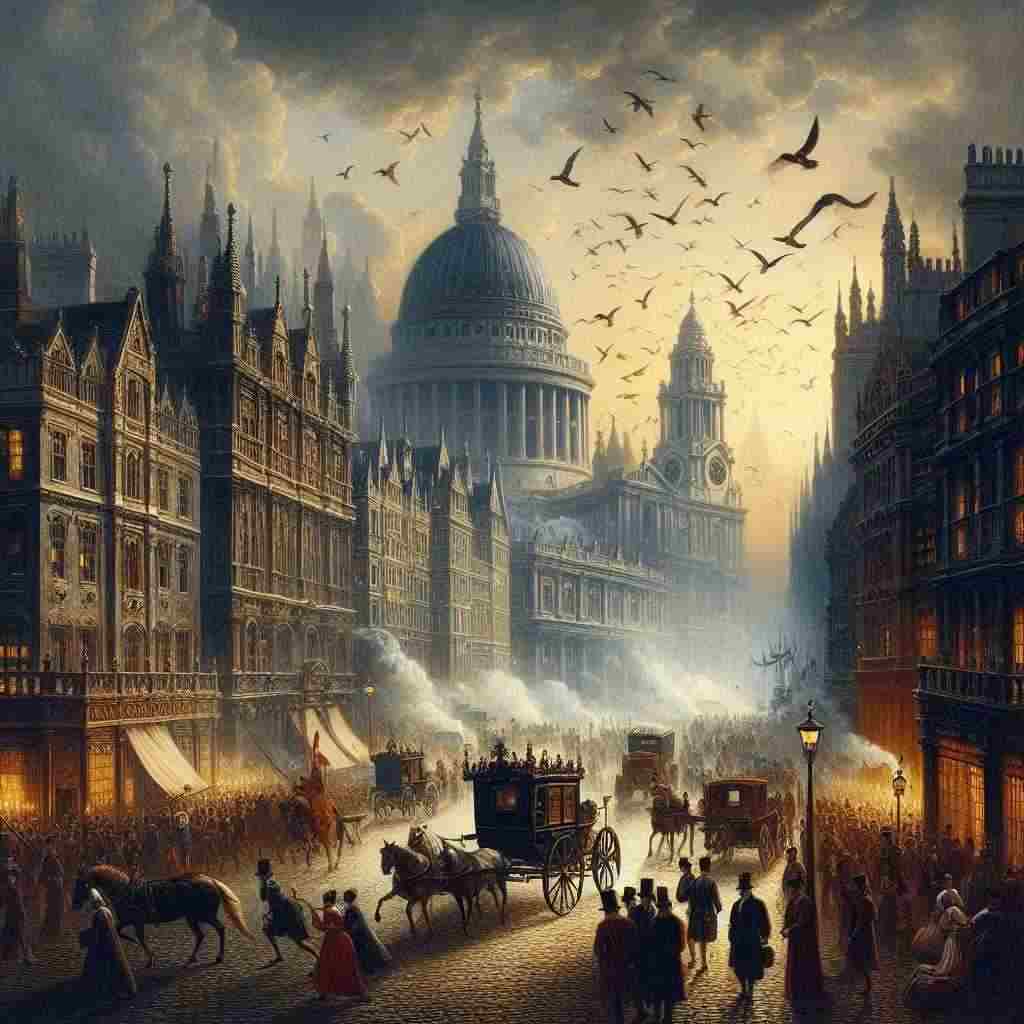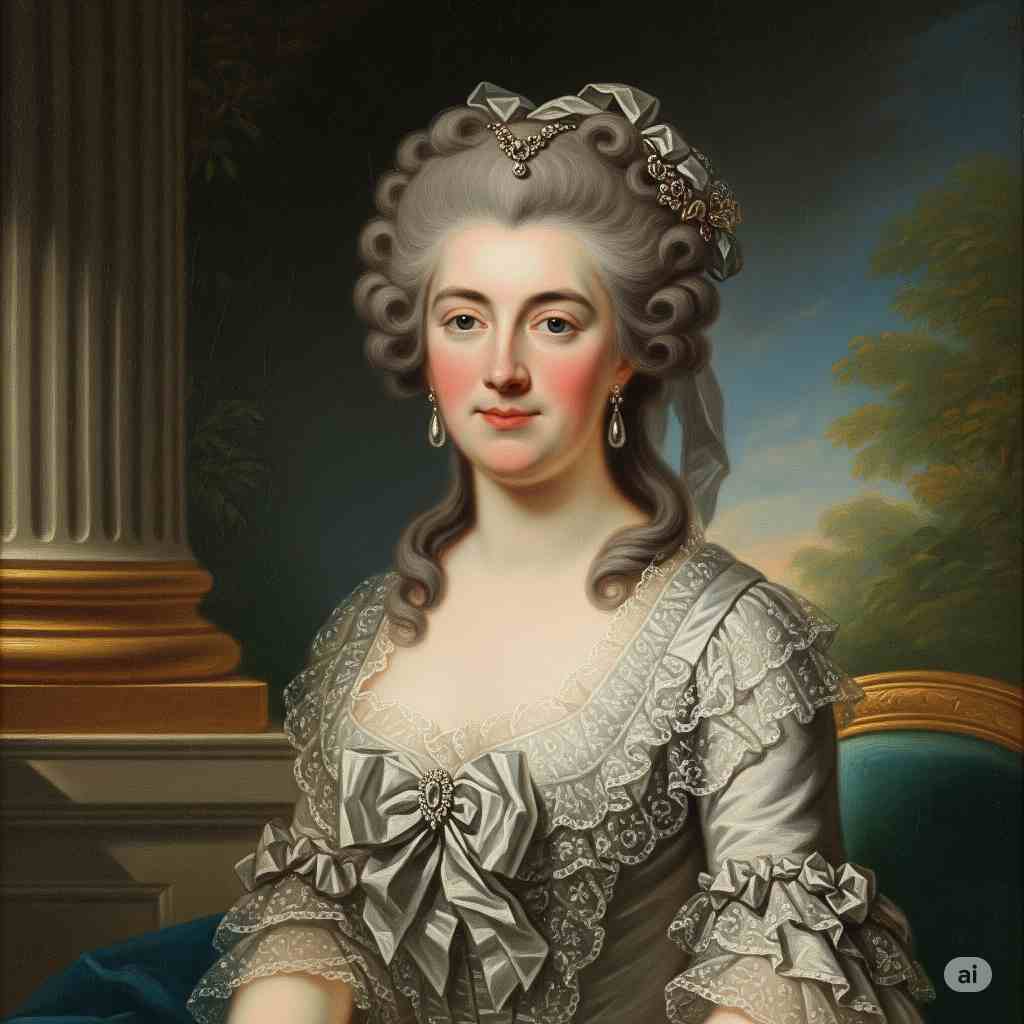London's Summer Morning
Mary Robinson
1757 to 1800

Who has not waked to list the busy sounds
Of summer’s morning, in the sultry smoke
Of noisy London? On the pavement hot
The sooty chimney-boy, with dingy face
And tattered covering, shrilly bawls his trade,
Rousing the sleepy housemaid. At the door
The milk-pail rattles, and the tinkling bell
Proclaims the dustman’s office; while the street
Is lost in clouds impervious. Now begins
The din of hackney-coaches, waggons, carts;
While tinmen’s shops, and noisy trunk-makers,
Knife-grinders, coopers, squeaking cork-cutters,
Fruit-barrows, and the hunger-giving cries
Of vegetable-vendors, fill the air.
Now every shop displays its varied trade,
And the fresh-sprinkled pavement cools the feet
Of early walkers. At the private door
The ruddy housemaid twirls the busy mop,
Annoying the smart ’prentice, or neat girl,
Tripping with band-box lightly. Now the sun
Darts burning splendor on the glittering pane,
Save where the canvas awning throws a shade
On the gay merchandise. Now, spruce and trim,
In shops (where beauty smiles with industry)
Sits the smart damsel; while the passenger
Peeps through the window, watching every charm.
Now pastry dainties catch the eye minute
Of humming insects, while the limy snare
Waits to enthrall them. Now the lamp-lighter
Mounts the tall ladder, nimbly venturous,
To trim the half-filled lamps, while at his feet
The pot-boy yells discordant! All along
The sultry pavement, the old-clothes-man cries
In tone monotonous, while sidelong views
The area for his traffic: now the bag
Is slyly opened, and the half-worn suit
(Sometimes the pilfered treasure of the base
Domestic spoiler), for one half its worth,
Sinks in the green abyss. The porter now
Bears his huge load along the burning way;
And the poor poet wakes from busy dreams,
To paint the summer morning.
Mary Robinson's London's Summer Morning
Mary Robinson's poem "London's Summer Morning" offers a vivid and dynamic portrait of urban life in early 19th century London. Through its rich sensory details and carefully observed scenes, the poem provides a compelling snapshot of the city awakening to a new day, capturing the essence of London's bustling atmosphere and diverse inhabitants.
The poem's structure is notable for its use of blank verse, employing unrhymed iambic pentameter to create a rhythm that mimics the steady pace of city life. This form allows Robinson to maintain a conversational tone while elevating the subject matter through poetic language. The lack of stanza breaks contributes to the sense of continuous movement and the relentless progression of the morning's activities.
Robinson's use of imagery is particularly striking, engaging all the senses to immerse the reader in the London streetscape. Auditory imagery dominates the opening lines, with the "busy sounds" of the morning described in detail. The "shrill" cries of the chimney sweep, the rattling milk pail, and the "din of hackney-coaches" create a cacophonous backdrop that effectively conveys the city's energy. Visual imagery is equally prominent, with vivid descriptions of the "sooty chimney-boy" and the "glittering pane" of shop windows bringing the scene to life. The poet also incorporates tactile sensations, such as the "pavement hot" and the cooling effect of the "fresh-sprinkled pavement," as well as olfactory hints with the mention of the "sultry smoke."
A key aspect of the poem is its focus on the working class and the various trades that animate the city. Robinson catalogues a diverse array of occupations, from chimney sweeps and milk vendors to knife-grinders and cork-cutters. This emphasis on labor and commerce paints a picture of a city defined by its industry and the interdependence of its inhabitants. The poem thus serves as a valuable historical document, offering insight into the economic and social fabric of early 19th century London.
The progression of the poem mirrors the advancement of the morning, moving from the early risers like the chimney sweep and milk vendor to the gradual awakening of shops and businesses. This temporal structure allows Robinson to capture the city's transformation from the quiet of dawn to the full bustle of day. The pacing of the poem, with its accumulation of details and activities, creates a sense of mounting energy and complexity that reflects the city's own rhythms.
Robinson's use of personification and metonymy adds depth to her portrayal of the city. London itself becomes a living entity, with its "sultry smoke" and "clouds impervious." The shops are described as "displaying" their trade, while the sun "darts burning splendor," imbuing inanimate objects with a sense of agency and purpose. This technique blurs the line between the city's inhabitants and its physical structures, suggesting a symbiotic relationship between people and place.
The poem also touches on themes of class and gender. The contrast between the "sooty chimney-boy" and the "smart damsel" in the shop window highlights the stark social divisions within the city. The mention of the "poor poet" at the poem's conclusion adds a self-reflexive element, positioning the act of artistic creation within the broader context of urban labor.
While the overall tone of the poem is one of energetic observation, there are hints of darker undertones. The reference to the "pilfered treasure of the base domestic spoiler" in the old-clothes-man's wares suggests the presence of crime and exploitation beneath the surface of city life. Similarly, the image of insects caught in a "limy snare" could be read as a metaphor for the city's capacity to entrap its inhabitants.
In conclusion, "London's Summer Morning" stands as a masterful example of descriptive poetry, offering a nuanced and multifaceted portrait of urban life in the early 19th century. Through its careful attention to detail, innovative use of poetic techniques, and insightful social commentary, Robinson's poem provides a valuable window into the sights, sounds, and rhythms of historical London while simultaneously exploring timeless themes of labor, class, and the human experience within the urban environment.
London's Summer Morning 2025 - A modern interpretation inspired by Mary Robinson's poem
This text was generated by AI and is for reference only. Learn more
Want to join the discussion? Reopen or create a unique username to comment. No personal details required!



Comments
No comments yet. Be the first to comment!